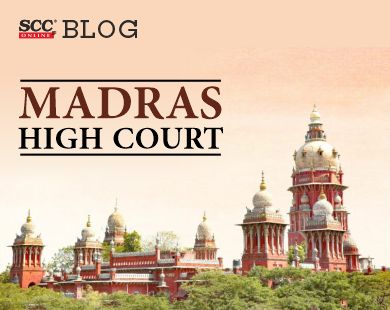Madras High Court: In public interest litigation filed for directing the respondents to open all retail outlets, pubs and bars situated in Tamil Nadu only between 2.00 pm and 8.00 pm to sell all alcoholic breweries and to take appropriate action in case of violation of the norms, the division bench of R. Mahadevan and J. Sathya Narayana, JJ. gave the following directions/suggestions:
-
The Central Government may take into consideration and give instructions to the State and Director General of police to impose a licensing regime for sale, purchase and usage of Indian made foreign liquor.
-
The State Government shall give necessary instructions to the retail outlet shops through Tamil Nadu State Marketing Corporation Limited (‘TASMAC') that only the consumer, who has an alcohol license, can be permitted to buy Indian made foreign liquor.
-
The labelling requirements under the Food Safety and Standards (Alcoholic Beverages) Regulations, 2018 and the Food Safety and Standards (Packing and Labeling) Regulations, 2011 shall be strictly complied with.
-
The State government shall also consider printing the labels, displaying price list and contact details for registering complaints in Tamil.
-
The State government and TASMAC shall ensure the strict compliance of the regulations relating to management and administration of staff, etc.
-
The State Government shall ensure that liquor is not sold to persons below 21 years of age.
-
The State Government and TASMAC may consider reducing the business hours i.e., between 2.00 PM and 8.00 P.M. considering public health and welfare.
The Court said that Article 47 of the Constitution of India imposes a duty on the State to raise the level of nutrition and the standard of living and to improve public health, in particular, the State is required take endeavour in bringing about prohibition of the consumption except for medicinal purposes of intoxicating drinks and of drugs which are injurious to health.
Further, it said that the rate of drunken driving fatalities is very high in the state. Even the students and persons under 21 years of age are consuming liquor, which has considerably affected the socio-economic milieu in the state and has resultantly increased the number of crimes and offences. Even though Rule 11-A of the Tamil Nadu Liquor Vending (in Shops and Bars) Rules, 2003, prohibits underage drinking by providing that liquor is not to be sold to persons who have not completed 21 years of age and that there is a penal provision under Section 188 of the Penal Code, 1860 (‘IPC'), for selling liquor to underage drinkers and consumption of alcohol by underage drinkers. However, no effective action has been taken by the authorities against such violators according to law, and no regulations have been strictly followed in respect of sale of liquor, label specification, etc. That apart, the harmful use of alcohol has a direct impact on many health-related targets of Sustainable Development Goals specifically those related to maternal and child health, infectious diseases, non-communicable diseases and mental health, which calls for licensing system on par with the other countries.
The Court said that alcohol consumption and its harmful use is a social evil which has led to break down of social framework. Alcohol consumption not only affects the individual, but its behavioral implications affect the immediate family members, colleagues and other strangers in interaction with the consumer. It leads to various physical and mental health problems and has been the major cause for fatal motor vehicle accidents. The younger population of the country are frequent users of alcohol as they no longer do wait for their legal age to drink. This is extremely harmful to them, to society and to the country in the long run. Therefore, it becomes important to recognize the signs of alcohol abuse and addiction and to seek help immediately.
Further, it said that alcohol disorders are often linked to poverty, illiteracy and unemployment and hence, reducing alcohol dependence and addiction must be considered a socio-economic as well as a public health issue which requires effective initiatives from the government on diverse levels. It is indispensable for the authorities to take strong steps to educate and enforce rules to reduce the consumption of alcohol. It must launch awareness programs to highlight the evils of alcohol at a personal and societal level and must impose strict laws and regulations on the consumption and distribution of alcohol and to curtail the accessibility of alcohol, especially to the younger generation.
[B. Ramkumar Adityan v. Additional Chief Secretary, 2023 SCC OnLine Mad 127, decided on 04-01-2023]
Advocates who appeared in this case :
For Petitioner: Advocate Karthick Subramanian
For Respondents: Additional Advocate General R. Baskaran
Government Pleader P. Thilak Kumar
Additional Public Prosecutor T. Senthil Kumar
Advocate H. Arumugam
*Apoorva Goel, Editorial Assistant has reported this brief.







